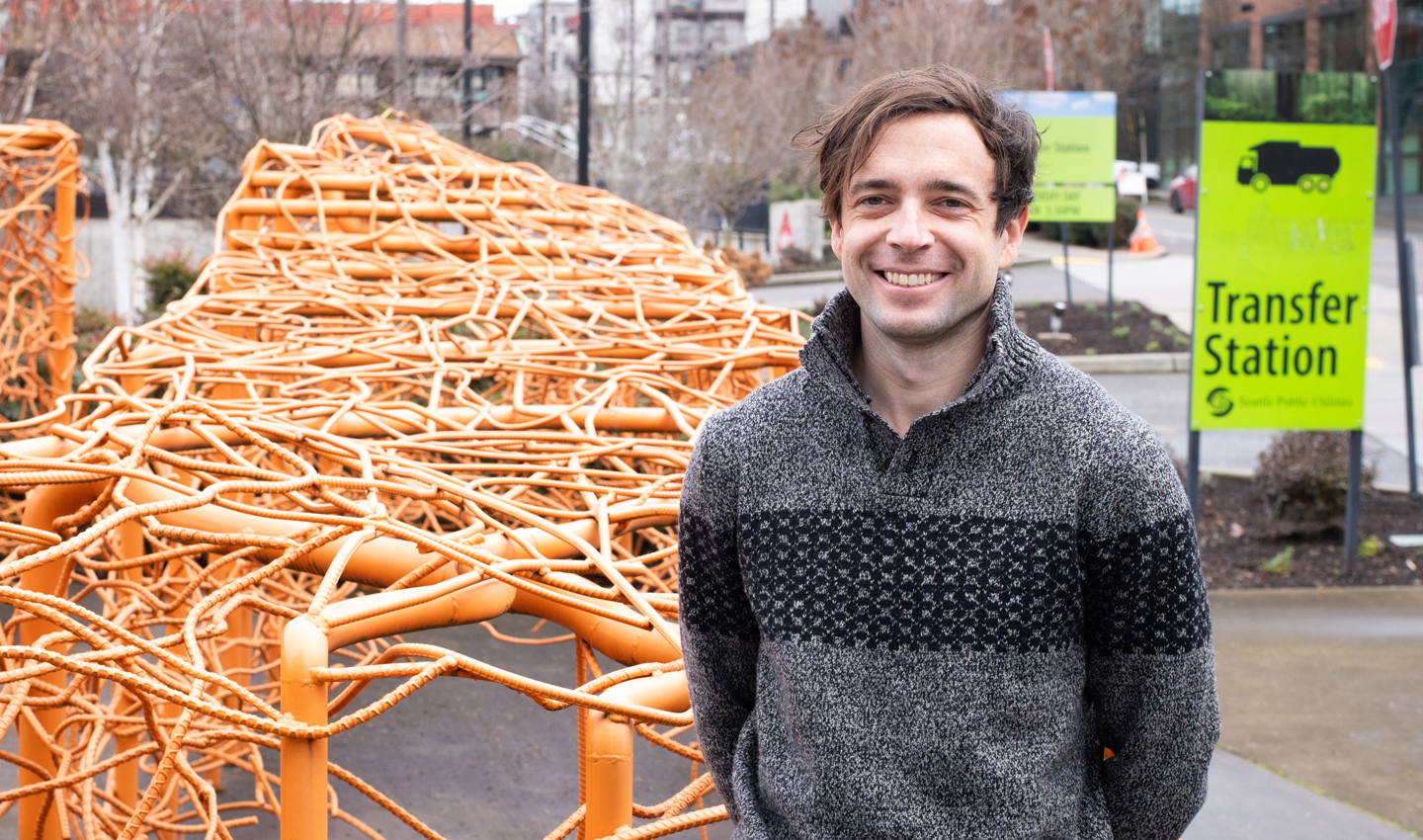As an iSchool doctoral candidate, Nick Logler spent weeks rummaging through trash piles on the side of the road, ferreting around in thrift stores, and browsing platforms like Craigslist. Discarded desktop printers were his target, and he ultimately collected more than a dozen to supply workshops for middle schoolers to explore concepts like materiality and disassembly.
They would take the defunct printers apart, then observe and identify the components beneath the surface. After brainstorming and reimagining applications for these parts, the students built entirely new objects. Workshops like these are designed to make visible and tangible the material reality of a consumer technology, said Logler, and they resonate well with participants.
“They are amazed by the number of screws,” said Logler, ‘23. “They open it up and there are springs, gears, and it’s sticky and messy. They pull out cables. What was a magic digital box becomes physical and embodied.”
Now a postdoctoral researcher at the University of Washington Information School, Logler is developing resources to support more proactive and thoughtful technology policymaking. He was recently awarded a Siegel Research Fellowship to continue his work at the Tech Policy Lab, work he says engages two main audiences: policymakers, who are responsible for legislating how technology is made, sold and discarded, and young people, who will be the next generation’s technologists and policymakers.

His research focuses on e-waste, particularly from consumer technologies. As the average amount of e-waste generated by each American every year balloons to nearly 50 pounds, there is still no federal policy for managing it. But a federal right-to-repair law, according to Logler, would reduce e-waste by making it easier for consumers and small businesses to fix electronics rather than discard them. The U.S. could follow the European Union and mandate a common charger, significantly reducing the number of cords and adapters bought and discarded.
“There’s a moral imperative to rethink our relationship with digital technologies,” said Logler. “Different countries, especially in the Global North and West, are increasing their demand for stuff. There are hard limits that we start to approach.” We are approaching that limit with lithium, an integral component of rechargeable batteries. Demand is rapidly eclipsing supply, and securing access to it is becoming a geopolitical issue.
Meanwhile, as Logler explains in a recent paper he co-authored, the language of computer science obscures the massive physical infrastructure required for digital technologies to work. "The cloud" sounds weightless, but it’s made up of data centers that require water and cooled air, with computers that need cables, lithium and other minerals like copper and cobalt.
Generative artificial intelligence, too, is a “nice interface that you experience at your computer or mobile device,” said Logler, “but there is a huge amount of training that goes into that as well as an incredible amount of computing power requiring energy, heat, water.” Few people realize the intense resource extraction and long trail of material impact that precede the moment we sit down at a computer or pull out a smartphone to ask ChatGPT a question.
Logler’s approach aligns with the Tech Policy Lab, where researchers see technology as a tool that can offer promise as well as pose threats, program manager Alex Bolton said. “Tech can be good or bad. Let’s try to make it be more good than bad, and let’s be thoughtful and aware of all its implications.” Logler’s work there includes co-editing Telling Stories, a collection of narratives from people all over the world exploring the potential impact of AI on their lives, and co-writing Ways to Grow, a white paper that offers solutions to make our agricultural systems more resilient.
Logler is also affiliated with the Value Sensitive Design Lab, which is co-directed by his Ph.D. and postdoc advisor, iSchool Professor Batya Friedman. She noted that his master’s in ethics, peace and global studies and his policy experience prepared him to contribute to the Voices from the Rwanda Tribunal project, which explored the role information systems can play in transitional justice and healing following genocide. “Nick was key in developing a toolkit on generative value sensitive design thinking – the Metaphor Cards – which we brought to our research designing information systems and related policies to support international justice institutions,” Friedman said.
Looking ahead, Logler is considering careers inside and beyond the academy. “There are exciting opportunities to weave together teaching, research and work with local communities,” he said. The Siegel Fellowship affords him access to an extensive national network of people in academia and government. Logler notes that while he’s been “an observer, commenter and researcher, this postdoc and fellowship are opening up channels to talk to people that are tied closer to policy.”
Research recently published in Nature found that the total mass of human-created objects has already surpassed the mass of Earth's life forms. Despite this bleak picture, Logler adopts a hopeful ethos. He is energized by the designers and builders who are reimagining how we make and recycle technology. It’s rewarding, he said, to see the motivation, curiosity and excitement in Informatics or law classrooms as well as in makerspaces and workshops. “I collect these examples of people reimagining and reinventing materials and processes for building or working with materials, and I keep those in a little bank of hope.”
